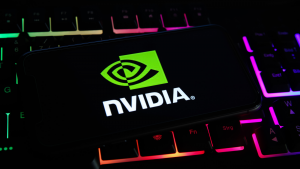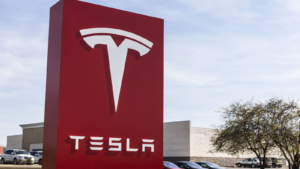Artificial Intelligence, or AI, has been the hottest sector in the stock market. Since OpenAI released ChatGPT in November 2022, it has been a race to develop the best and smartest generative AI platforms. Bloomberg Intelligence issued a report that potentially valued the generative AI industry at $1.3 trillion by 2032. The AI hardware sector has exploded in value with every major tech company scrambling to buy high-powered GPUs. Semiconductor stocks have led the massive Nasdaq and S&P 500 rally over the past year. Over the past twelve months, the iShares Semiconductor ETF (NASDAQ:SOXX) has gained more than 54%. Yet there could now be newly risky AI stocks.
Many of these AI stocks have become overvalued and diverge from their fundamentals. At their current values, it’s hard to justify chasing them after rallying for over a year. These three AI stocks flash danger signs and should be avoided at their current multiples.
Intel (INTC)

Years ago, Intel (NASDAQ:INTC) was the king of the chip industry. However, a drop in PC demand and being replaced as the chip provider for Apple’s (NASDAQ:AAPL) Macbook computers sent Intel into a downward spiral. While other chip stocks have flourished, shares of INTC are down by more than 30% in 2024.
Some believed that Intel would be boosted after a deal with the US government. The agreement saw Intel receive $8.5 billion in funding to advance its AI chip technology. Despite this, Intel continues to lose ground in its core CPU business. Chip-rivals AMD (NASDAQ:AMD) and Arm Holdings (NASDAQ:ARM) are eating away at Intel’s market share after creating CPUs with superior performance and speed.
As a result, Intel is showing a negative revenue growth CAGR over the past five years. They are one of the only chip companies with negative growth in recent years. Comparatively, AMD has a five-year revenue CAGR of 30%, and ARM has a three-year CAGR of 17%. Intel is still trading at nearly 30x forward earnings, even with a five-year net income CAGR of -28%. The stock is too richly valued for its declining growth as it continues falling behind its peers and into a category of risky AI stocks.
Nvidia (NVDA)

No stock has been as front and center for the AI revolution as NVIDIA (NASDAQ:NVDA). I outlined my views on Nvidia a couple of weeks ago, and thus far, my thesis for calling Nvidia’s peak has been playing out. Shares of NVDA are up by nearly 200% over the past year of trading.
Nvidia’s recent 10-for-one stock split not only continued the stock’s snowball but also made shares more accessible to retail investors. Those left out of the stock’s historic one-year rally FOMO’d into the stock at the top. Nvidia also faces the threat of homegrown GPUs from companies like Meta Platforms (NASDAQ:META) and Amazon (NASDAQ:AMZN) and cheaper domestic offerings in China. Through its Made in 2025 policy, China plans to produce 70% of its chips domestically by the year 2025.
There is no denying that the company’s recent growth has been impressive. Analysts have a current average price target of $119.32 and the stock even received a downgrade from a rating of Buy to Neutral by New Street Research. Nvidia will not continue to grow its revenue at a five-year CAGR of nearly 50%. With shares trading at 40x sales, any decline in revenue growth will result in the stock becoming increasingly overvalued. Nvidia is not the only way to gain exposure to AI.
Tesla (TSLA)

Not many people think of Tesla (NASDAQ:TSLA) as an AI company, yet. What was once the most popular stock on the market has struggled in 2024, only recently bringing their year-to-date returns above water. After gaining nearly 30% in the first week of July, the stock has returned 1.2% in 2024 to shareholders.
Much of Tesla’s long-term potential revolves around AI-based initiatives like their Robotaxi and Optimus robots. Tesla Bulls also believes in the future of their FSD technology as well as public listings of Elon Musk’s other companies like SpaceX. But most, if not all, of these initiatives are a long way off from being a reality and some may never even come to fruition. Tesla vehicles are the best-selling EVs on the planet yet the market is pricing Tesla as more than just an automaker.
Even if Tesla were a full AI company, the stock now trades at a sky-high valuation. At 101x forward earnings, Tesla trades at double Nvidia’s price-to-earnings ratio. There is a future where Tesla is a leader in AI technology and software. Until we see any of these play out and hit the market, Tesla has to be considered an automaker more than an AI leader and thus one of the risky AI stocks on the market.
On the date of publication, Michael Que held a LONG position in AMZN. The opinions expressed in this article are those of the writer, subject to the InvestorPlace.com Publishing Guidelines.
On the date of publication, the responsible editor did not have (either directly or
indirectly) any positions in the securities mentioned in this article.
